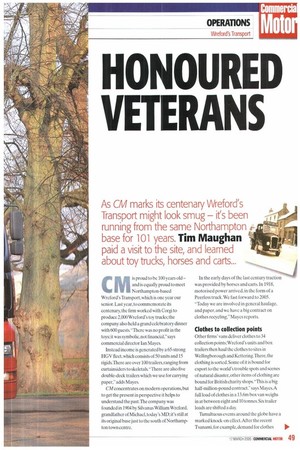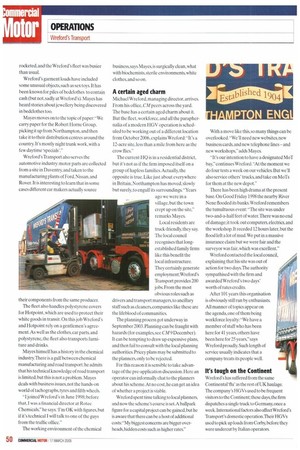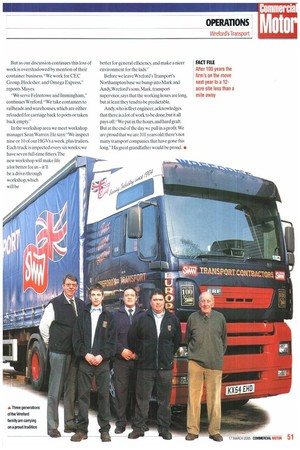HONOURED VETERANS
Page 51

Page 52

Page 53

If you've noticed an error in this article please click here to report it so we can fix it.
As CM marks its centenary Wreford's
Transport might look smug — ifs been
running from the same Northampton 44
base for 101 years. Tim Maughan paid a visit to the site, and learned about toy trucks, horses and carts...
Cis pdro. ud to blie 1pOrOeuydeators old— ant IIhNorthampton-based Wreford'sTransport, which is one year our senior. Last year, to commemorate its centenary, the firm worked with Corgi to produce 2,000 Wreford's toy trucks; the company also held a grand celebratory dinner with 600 guests "There was no profit in the toys; it was symbolic, not financial," says commercial director Ian Mayes.
Instead income is generated by a 65-strong HGV fleet, which consists of 50 units and 15 rigid& There are over 100 trailers, ranging from curtainsiders to skeletals."There are also five double-deck trailers which we use for carrying paper," adds Mayes.
CM concentrates on modern operations, but to get the present in perspective it helps to understand the past.The company was founded in 1904 by Silvanus William Wreford, grandfather of Michael, today's MD; it's still at its original base just to the south of Northampton town centre. In the early days of the last century traction was provided by horses and carts. In 1918, motorised power arrived, in the form of a Peerless truck.We fast forward to 2005. "Today we are involved in general haulage, and paper, and we have a big contract on clothes recycling," Mayes reports.
Clothes to collection points
Other firms' vans deliver clothes to 34 collection points; Wreford's units and box trailers then haul the clothes to sites in Wellingborough and Kettering.There, the clothing is sorted. Some of it is bound for export to the world's trouble spots and scenes of natural disaster, other items of clothing are bound for British charity shops. "This is a big half-million-pound contract," says Mayes.A full load of clothes in a 13.6m box van weighs in at between eight and 10 tonnes. Six trailer loads are shifted a day.
Tumultuous events around the globe have a marked knock-on effect.After the recent Tsunami, for example, demand for clothes rocketed, and the Wreford's fleet was busier than usual.
Wreford's garment loads have included some unusual objects,such as sex toys. It has been known for piles of bedclothes to contain cash (but not, sadly at Wreford's). Mayes has heard stories about jewellery being discovered in bedclothes too, Mayes moves on to the topic of paper:"We carry paper for the Robert Horne Group, picking it up from Northampton, and then take it to their distribution centres around the country. Its mostly night trunk work, with a few daytime 'specials'."
Wreford's Transport also serves the automotive industry: motor parts are collected from a site in Daventry, and taken to the manufacturing plants of Ford. Nissan, and Rover. It is interesting to learn that in some cases different car makers actually source their components from the same producer.
The fleet also handles polystyrene covers for Hotpoint, which are used to protect their white goods in transit. On this job Wreford's and Hotpoint rely on a gentlemen's agreement.As well as the clothes, car parts, and polystyrene, the fleet also transports furniture and drinks.
Mayes himself has a history in the chemical industry.There is a gulf between chemical manufacturing and road transport: he admits that his technical knowledge of road transport is limited,but this is not a problem. Mayes deals with business issues, not the hands-on world of tachographs, tyres and fifth wheels.
"I joined Wreford's in June 1998; before that, I was a financial director at Rotec Chemicals," he says. 'I'm OK with figures, but if it's technical! will talk to one of the guys from the traffic office."
The working environment of the chemical business, says Mayes, is surgically clean, what with biochemists, sterile environments, white clothes, and soon.
A certain aged charm
Michael Wreford, managing director, arrives. From his office, CM peers across the yard. The base has a certain aged charm about it. But the fleet, workforce, and all the paraphernalia of a modern FIGV operation is scheduled to be working out of a different location from October 2006. explains Wreford: "It's a 12-acre site, less than a mile from here as the crow flies.
The current HO is in a residential district, but it's not as if the firm imposed itself on a group of hapless families. Actually, the opposite is true. Like just about everywhere in Britain.Northampton has moved, slowly but surely, to engulf its surroundings. "Years ago we were in a village, but the town crept up on the site," remarks Mayes.
Local residents are truck-friendly, they say. The local council recognises that longestablished family firms like this benefit the local infrastructure. They certainly generate employment;Wreford's Transport provides 200 jobs. From the most obvious roles such as drivers and transport managers, to ancillary staff such as cleaners, companies like these are the lifeblood of communities.
The planning process got underway in September 2003. Planning can be fraught with hazards (for examples, see CM 9 December). It can be tempting to draw up expensive plans, and then fail to consult with the local planning authorities. Pricey plans may be submitted to the planners, only Lobe rejected.
For this reason it is sensible to take advantage of the pre-application discussion. Here an operator can informally chat to the planners about his scheme.At no cost, he can get an idea of whether a project is viable.
Wreford spent time talking to local planners, and now the scheme's course is set.A ballpark figure for a capital project can be gained, but he is aware that there can be a host of additional costs: "My biggest concerns are bigger overheads, hidden costs such as higher rates." With a move like this, so many things can be overlooked."We'll need new websites, new business cards, and new telephone lines — and new workshops," adds Mayes.
"It's our intention to have a designated MoT bay," continuesWreford."At the moment we do four tests a week on our vehicles. But we'll also service others' trucks, and take on MoTs for them at the new depot."
There has been high drama at the present base. On Good Friday 1998 the nearby River Nene flooded its banks.Wreford remembers the tumultuous event: "The site was under two-and-a-half feet of water.There was no end of damage; it took out computers, electrics, and the workshop. It receded 12 hours later, but the flood left a lot of mud. We put in a massive insurance claim but we were fair and the surveyor was fair, which was excellent."
Wreford contacted the local council, explaining that his site was out of action for two days.The authority sympathised with the firm and awarded Wreford's two days' worth of rates credits.
After 101 years this organisation is obviously still run by enthusiasts. All manner of topics appear on the agenda, one of them being workforce loyalty: "We have a member of staff who has been here for 41 years, others have been here for 25 years," says Wreford proudly. Such length of service usually indicates that a company treats its people well.
It's tough on the Continent
Wreford's has suffered from the same Continental 'flu' as the rest of UK haulage. The company's HGVs used to be frequent visitors to the Continent;these days, the firm dispatches a single truck to Germany, once a week. International factors also affect Wreford's Transport's domestic operation.Their HGVs used to pick up loads from Corby, before they were undercut by Italian operators. But as our discussion continues this loss of work is overshadowed by mention of their container business. "We work for CEC Group, Hecksher. and Omega Express," reports Mayes.
"We serve Felixstowe and Imnaingham," continues Wreford."We take containers to railheads and warehouses, which are either reloaded for carriage back to ports or taken back empty."
In the workshop area we meet workshop manager Sean Warren. He says:" We inspect nine or 10 of our HGVs a week, plus trailers. Each truck is inspected every six weeks:we have seven full-time fitters.The new workshop will make life a lot better for us — it'll be a drive-through workshop, which will be better for general efficiency, and make a nicer environment for the lads."
Before we leave Wreford's Transport's Northampton base we bump into Mark and Andy,Wreford's sons. Mark, transport supervisor, says that the working hours are long, but at least they tend to be predictable.
Andy, who is fleet engineer, acknowledges that there is a lot of work to be done, but it all pays off: "We put in the hours, and hard graft. But at the end of the day we pull in a proflt.We are proud that we are 101 years old:there's not many transport companies that have gone this long." His great grandfather would be proud.










































































































































































































